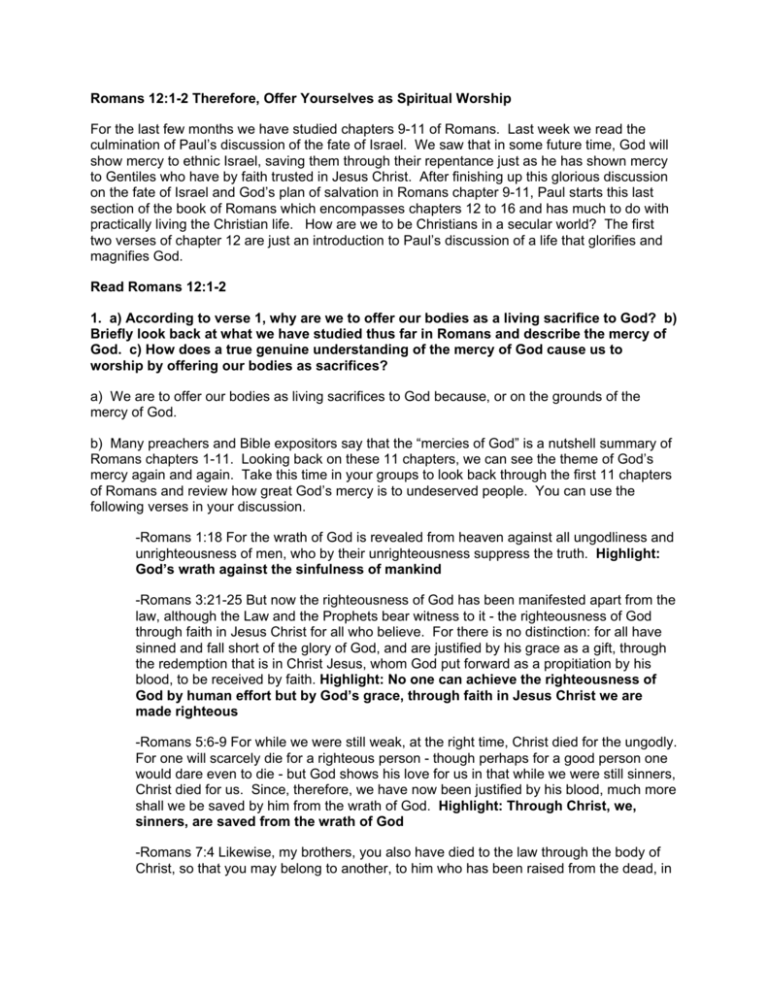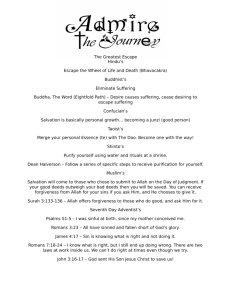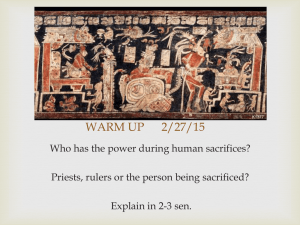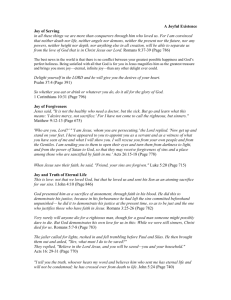Romans 12:1
advertisement

Romans 12:1-2 Therefore, Offer Yourselves as Spiritual Worship For the last few months we have studied chapters 9-11 of Romans. Last week we read the culmination of Paul’s discussion of the fate of Israel. We saw that in some future time, God will show mercy to ethnic Israel, saving them through their repentance just as he has shown mercy to Gentiles who have by faith trusted in Jesus Christ. After finishing up this glorious discussion on the fate of Israel and God’s plan of salvation in Romans chapter 9-11, Paul starts this last section of the book of Romans which encompasses chapters 12 to 16 and has much to do with practically living the Christian life. How are we to be Christians in a secular world? The first two verses of chapter 12 are just an introduction to Paul’s discussion of a life that glorifies and magnifies God. Read Romans 12:1-2 1. a) According to verse 1, why are we to offer our bodies as a living sacrifice to God? b) Briefly look back at what we have studied thus far in Romans and describe the mercy of God. c) How does a true genuine understanding of the mercy of God cause us to worship by offering our bodies as sacrifices? a) We are to offer our bodies as living sacrifices to God because, or on the grounds of the mercy of God. b) Many preachers and Bible expositors say that the “mercies of God” is a nutshell summary of Romans chapters 1-11. Looking back on these 11 chapters, we can see the theme of God’s mercy again and again. Take this time in your groups to look back through the first 11 chapters of Romans and review how great God’s mercy is to undeserved people. You can use the following verses in your discussion. -Romans 1:18 For the wrath of God is revealed from heaven against all ungodliness and unrighteousness of men, who by their unrighteousness suppress the truth. Highlight: God’s wrath against the sinfulness of mankind -Romans 3:21-25 But now the righteousness of God has been manifested apart from the law, although the Law and the Prophets bear witness to it - the righteousness of God through faith in Jesus Christ for all who believe. For there is no distinction: for all have sinned and fall short of the glory of God, and are justified by his grace as a gift, through the redemption that is in Christ Jesus, whom God put forward as a propitiation by his blood, to be received by faith. Highlight: No one can achieve the righteousness of God by human effort but by God’s grace, through faith in Jesus Christ we are made righteous -Romans 5:6-9 For while we were still weak, at the right time, Christ died for the ungodly. For one will scarcely die for a righteous person - though perhaps for a good person one would dare even to die - but God shows his love for us in that while we were still sinners, Christ died for us. Since, therefore, we have now been justified by his blood, much more shall we be saved by him from the wrath of God. Highlight: Through Christ, we, sinners, are saved from the wrath of God -Romans 7:4 Likewise, my brothers, you also have died to the law through the body of Christ, so that you may belong to another, to him who has been raised from the dead, in order that we may bear fruit for God. Highlight: we are no longer bound to the requirements of the law -Romans 8:31-32 What then shall we say to these things? If God is for us, who can be against us? He who did not spare his own Son but gave him up for us all, how will he not also with him graciously give us all things? Highlight: The glory of Romans chapter 8 and God’s amazing love for us -Romans 11:32 For God has consigned all to disobedience, that he may have mercy on all. Highlight: Review God’s plan of salvation for Gentiles as well as for Israel c) The word for “worship” in this verse is from the Greek word “latreia” which is used in the OT to describe work done in the temple. This is contrary to the definition of worship that we are more familiar which is from the English root word “weordhscipe” which means worthiness or acknowledgment of worth. Other translation such as the NKJ translate the “worship” in v1 with “service”. A true understanding of our utter sinfulness and depravity in contrast to the glorious riches that God has freely given us in saving us through Jesus Christ should cause us to be humbled, as Paul tried to stress in chapter 11. In this humility we should give our “highest service” as described by John MacArthur which is our living bodies. This is our “reasonable” or logical worship in gratitude for His mercy. See also 2 Corinthians 5:14-17. 2. a) In Paul’s time, why did people offer sacrifices to God? What quality of animals would be use for their sacrifices (see Leviticus 1)? Why? b) How is the sacrifice that we are to offer described in v1? c) Why do you think the sacrifice we offer is described with these specific words “living”, “holy”, and “acceptable to God”? d) How do we offer our bodies as sacrifices that are “living”, “holy”, and “acceptable” to God (see Romans 6:13 Hebrews 13:15-16). e) Why didn’t Paul just ask Christians to offer animal sacrifices? a) In Paul’s time, Jews were still offering sacrifices at the Temple. Jesus taught about leaving your gift at the alter and reconciling with your brother, and Paul himself was once arrested in the temple while making a sacrifice for purification (Acts 21:26). Offerings were made as part of festivals such as the Passover but also for many other reasons. The priest offered burnt offerings daily and nightly in order to consecrate the tabernacle of meeting before the Lord (Exodus 29:38-42). Offerings were made for thanksgiving (Leviticus 7:12-13), Joshua renewed the people’s covenant with the Lord by offering burnt offerings (Joshua 8:31). Offerings were also offered for purification and also for atonement for sin. The animal used for the sacrifice was to be unblemished, offered freely, male. This type of animal was considered the best of the flock. b) Our sacrifice is of our “bodies”, “living”, it is “holy”, and it is acceptable to God. c) First of all, it is the sacrifice of our bodies, not our minds, hearts, or anything else. The body implies actions, what we do. In this sense, what we do must be pleasing to God as our acceptable service to God. Secondly, it is a living sacrifice. When we think of sacrifice, one word that can come to mind is martyrdom. Paul himself would become a martyr as a great persecution was brewing in the Roman world against Christians, but the sacrifice he describes here is living and thus it is what we do with our lives. Thirdly, the sacrifice is holy. This means we are to use our body for righteousness and not sin. Lastly, our sacrifice is acceptable to God. It would seem that a sacrifice that is holy would be acceptable to God. John Piper explains that this last description “acceptable to God” simply makes God explicit as the center of this worship. d) According to Romans 6:13, we are to present our members as instruments of righteousness and not unrighteousness. We are to reckon ourselves dead to sin. More so, we are to act as our merciful God would want us to. Hebrews 13:15-16 discusses our we are to do good and to share what we have as a sacrifice that pleases God. We will see later on Romans chapter 1 more examples of how we are to offer this type of sacrifice with our bodies. e) After Jesus Christ, animal sacrifice is now obsolete for believers. See Hebrews 9:11-12. 3. a) In verse 2, Paul urges believers to not be conformed to this world. Give some examples of how a believer can be conformed to this world. What are we to do instead? b) What does it mean to you that we are to “renew” our minds and how do we do it? How does this renewal lead to transformation, discerning of the will of God, and nonconformity to the world? a) The dictionary definition of conformity is behavior that agrees with socially acceptable standards. There are many possible answers to this question such as living for money, living for pleasure or any specific examples of such, exhorting worldly values over godly values, etc. Instead, we are to be transformed by the renewal of our minds. if you choose, add question, “why is it not enough that we have offered our bodies? Why does Paul add this part about renewing our minds? b) The NLT of “renewal of your mind” is “changing the way you think”. By the Holy Spirit we need to change our mindset to one that is focused on the things of God and righteousness. This should lead to transformation or metamorphosis so that as Jesus prayed, we might be “not of the world” (John 17:16). As we are transformed, we will seek to live in the will of God and not in sin or worldliness. Food for thought: What do you suppose is the consequence on a believer who refuses to heed the command in Romans 12:1-2 to offer up his body as a living sacrifice and to be transformed by the renewing of his mind? If a believer refuses to present themselves as a living sacrifice to God or to be transformed by the renewing of their mind, then they are not fully appreciating the mercies of God and not seeking to live in the perfect will of God. In this sense, they are in danger of being cut off from the olive tree of salvation. Personal Application 1. How can you better use your body as a living sacrifice to God? What tangible things can you do even tomorrow or this week with your body as spiritual worship to God? 2. What is one way that you feel you are too conformed to this world? How are we to not be conformed to this world but at the same time be an effective witness to our non-Christian friends?







